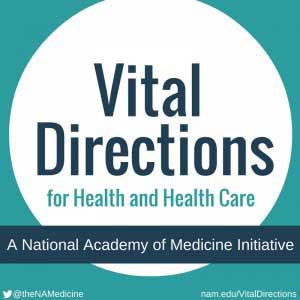About the Vital Directions for Health and Health Care Series

This publication is part of the National Academy of Medicine’s Vital Directions for Health and Health Care Initiative, which commissioned expert papers on 19 priority focus areas for U.S. health policy by more than 100 leading researchers, scientists, and policy makers from across the United States. The views presented in this publication and others in the series are those of the authors and do not represent formal consensus positions of the NAM, the National Academies of Sciences, Engineering, and Medicine, or the authors’ organizations. Learn more: nam.edu/VitalDirections
Major achievements in scientific research have enabled a new era of health-care delivery and treatment. Understanding of the underlying mechanisms of diseases is increasing and allowing scientists to develop new drugs, targeted therapies, and preventive strategies. A new form of health care that is based on data, algorithms, and precision molecular tools has become possible. Precision medicine—an emerging approach that integrates investigation of mechanisms of disease with prevention, treatment. and cure, resolved at the level of the individual subject or patient—has great potential to contribute to solutions for providing highvalue health care by improving outcomes while decreasing cost.
Despite recent breakthroughs and the growing momentum behind precision medicine, as evidenced by the launch of the U.S. Precision Medicine Initiative, there remain substantial challenges and barriers to its broad implementation in medical practice, including generating the needed evidentiary support for precision medicine, addressing data-sharing and infrastructure needs, incorporating genomic information into clinical care and research, reconciling the economics of precision medicine, and securing participant engagement and trust. Policy-makers will need to address those critical challenges if the full potential of precision medicine is to be realized. Building on the input of national leaders in precision medicine, this paper identifies and explores the challenges to and opportunities to achieve precision medicine and offers specific recommendations to achieve its potential. Read more >>
